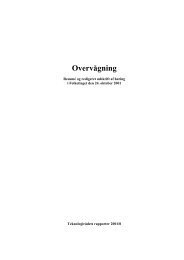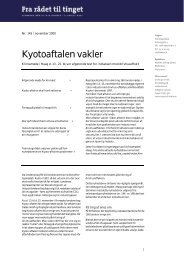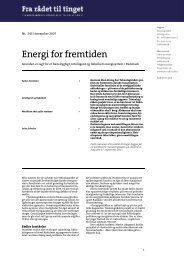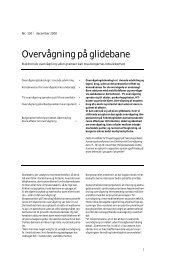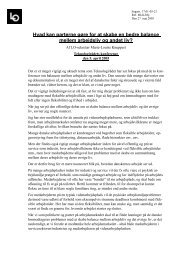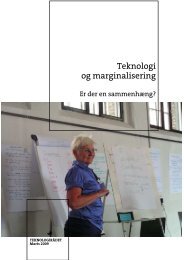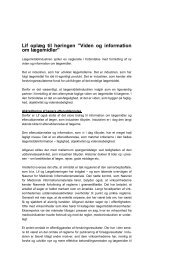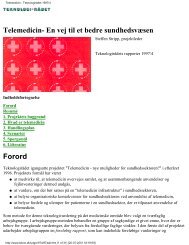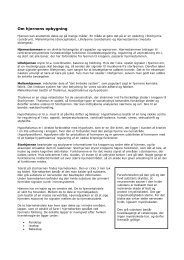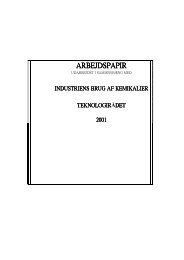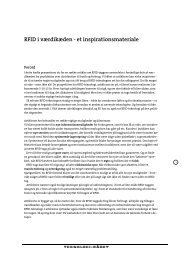Rapport: "Embryonale stamceller". - Teknologirådet
Rapport: "Embryonale stamceller". - Teknologirådet
Rapport: "Embryonale stamceller". - Teknologirådet
Create successful ePaper yourself
Turn your PDF publications into a flip-book with our unique Google optimized e-Paper software.
isk of a slide from the cloning of tissues to the<br />
cloning of human beings (reproductive cloning).<br />
Some people view embryo research as<br />
intrinsically immoral as they believe that from<br />
the moment of conception the human embryo<br />
has the full status of a human person. Such a<br />
viewpoint can not countenance any experimental<br />
procedure which entails the destruction of<br />
embryos, as the derivation of stem cells must.<br />
Another opposing concern is the integrity of<br />
individuals and their right not to be treated as a<br />
commodity, on the other hand, many people<br />
would regard it as morally acceptable to use<br />
embryos for purposes which will result in the<br />
therapy of major disabling conditions and<br />
diseases. On this view, the potential life, which<br />
the embryo represents, may be sacrificed for the<br />
good of actual persons. This attitude is<br />
reinforced by the fact that very many early embryos<br />
are lost naturally. Nevertheless, some, who see<br />
the embryos as no more than potential human<br />
life, still have concerns that the production of<br />
stem cells from human embryos may represent a<br />
modification of life and so be an affront to<br />
human dignity. Such a view favours either an<br />
Statement and recommendations<br />
There are two major considerations<br />
concerning this topic. Firstly, the scientific<br />
study of human stem cells is at such an<br />
early stage that it is necessary to carry<br />
out experiments on cells obtained from<br />
embryos and adults in parallel.<br />
Secondly, as shown in the accompanying<br />
table, the legislative situation governing<br />
work in this field differs considerably<br />
between countries represented in the ESF.<br />
The medical potential of stem cell therapy<br />
is obvious. Therapy using stem cells for<br />
diseases which involve the degeneration<br />
of defined cell types, such as diabetes,<br />
Parkinson’s disease or Huntington’s<br />
chorea, could become available within<br />
the foreseeable future. Stem cell therapy<br />
for diseases that affect whole organs or<br />
complex tissues is thought to be possible<br />
in the future, but in these cases, the<br />
potential is much longer term. Although<br />
progress in stem cell biology has been<br />
rapid, there are many important scientific<br />
questions that need to be addressed.<br />
outright ban on such uses of embryos, or a very<br />
strictly controlled experimental setting, in which<br />
the derivation of stem cells from embryos is only<br />
a stage leading to the application of the techniques<br />
developed to adult stem cells, obtained<br />
with fully informed consent.<br />
The second concern arising from embryo<br />
research is that if cloning of tissues is permitted,<br />
this may lead inevitably to the cloning of<br />
humans, since the techniques are the same. As<br />
with the derivation of stem cells from surplus<br />
embryos, the moral debate centres round the<br />
question of adequate legislative controls, to draw<br />
limits on what is permitted in scientific research<br />
in this field. All the work proposed would be on<br />
very early embryos in vitro, and there is no<br />
suggestion that any of these embryos would be<br />
implanted. However, it is necessary to have a<br />
very robust licensing system for such research<br />
and to make any actions which could lead to the<br />
implantation of cloned embryos a criminal<br />
offence. Without clear and enforceable<br />
legislation, there would be nothing to stop the<br />
slide to reproductive cloning.<br />
1. It is essential to proceed with research on stem<br />
cells derived from embryos, foetal tissues and<br />
adults, in parallel. Indeed, a key question is<br />
to what extent the different types of stem cells<br />
in the human embryo, foetus and adult differ.<br />
For example, the ease with which they can be<br />
made to multiply in culture, their longevity in<br />
culture in the laboratory, the range and nature<br />
of the mature cell types they can be induced<br />
to make, and the molecular signals that bring<br />
about these changes.<br />
2. Research is also required to overcome the<br />
problem of immunological rejection of cells<br />
from donors who are not genetically identical<br />
with the recipient.<br />
3. ESF recognises the major ethical concerns that<br />
surround this area of research. It recommends<br />
that all work on human stem cells should be<br />
properly regulated. In many countries the<br />
scientific community is engaged pro-actively<br />
in ensuring regulation is put in place.<br />
European Science Foundation Policy Briefing 4



